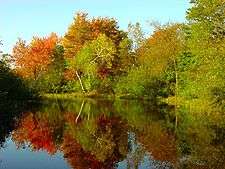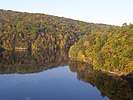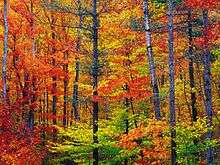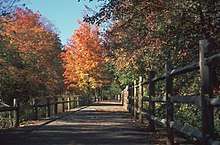Autumn in New England
Autumn in New England begins in late September and ends in late December, it marks the transition from summer to winter and is known for its vibrant colors and picturesque beauty. The autumn color of the trees and flora in New England has been reported to be some of the most brilliant natural color in the United States; as such, it is a popular tourist destination, attracting visitors from across North America and overseas. Travelers flock to Vermont, New Hampshire, Maine, and parts of Massachusetts to see the colors each fall, a practice known as leaf peeping.[1][2] Hiking during Autumn has become popular, and several areas offer guided tours.[3]
| |||||||
The combination of natural rugged landscape and rural, small town villages have made several areas in New England iconic locations for fall color photography. The numerous barns, church buildings, farmhouses, and villages combined with the vibrant seasonal colors makes for iconic photographs.[4]
Natural change
Across most of northern New England by mid-September the days are still warm, but the nights have become cool. This is the time in which deciduous trees begin the process of colorful changes in their foliage. In New England, a large percentage of trees produce a pigment known as an Anthocyanin, which results in brilliant reds and purples commonly seen around this time; a change that is particularly pronounced in the region's sugar maple trees.[5] This gradual process in which the trees change colors starts in far Northern New England in northern Maine and the higher elevations of Vermont and New Hampshire in mid September, reaching central New England areas of southern Vermont, southern New Hampshire, and Massachusetts by early October. By mid October the color peak reaches northern Rhode Island and northern Connecticut.
As one reaches southern Connecticut southward toward into New Jersey and points south, the number of sugar maple trees declines as the climate changes to a more temperate zone and oaks become more dominant, thus there are less bright colors.[4][6]
In popular culture
Autumn in New England has also become a popular theme in American popular culture, with many fictional stories being set in autumntime New England.[7]
References
- "New England Fall Foliage". Discover New England. Archived from the original on 2014-09-22. Retrieved 16 September 2014.
- "When autumn leaves fall". CNN. 12 October 2012. Retrieved 16 September 2014.
- "Walking & Hiking". Discover New England. Retrieved 26 September 2015.
- Paul Wade and Kathy Arnol (16 September 2014). "New England in the Fall: Trip of a Lifetime". Telegraph. Retrieved 26 September 2015.
- Archetti, Marco; Döring, Thomas F.; Hagen, Snorre B.; et al. (2011). "Unravelling the evolution of autumn colours: an interdisciplinary approach". Trends in Ecology & Evolution. 24 (3): 166–73. doi:10.1016/j.tree.2008.10.006. PMID 19178979.
- Paul Wade and Kathy Arnold (4 October 2016). "Everything you need to know about visiting New England in the Fall". Telegraph. Retrieved 29 August 2017.
- Andrea Greb (7 September 2014). "Fall in Love". Hellogiggles. Retrieved 16 September 2014.
External links
![]()




.jpg)